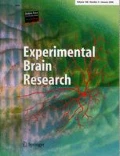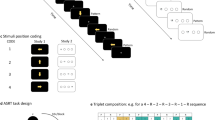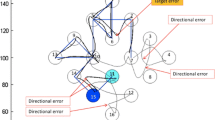Abstract
Implicit sequence learning is a fundamental mechanism that underlies the acquisition of motor, cognitive and social skills. The relationship between implicit learning and executive functions is still debated due to the overlapping fronto-striatal networks. According to the framework of competitive neurocognitive networks, disrupting specific frontal lobe functions, such as executive functions, increases performance on implicit learning tasks. The aim of our study was to explore the nature of such a relationship by investigating the effect of long-term regular alcohol intake on implicit sequence learning. Since alcohol dependency impairs executive functions, we expected intact or even better implicit learning in patient group compared to the healthy controls based on the competitive relationship between these neurocognitive networks. To our knowledge, this is the first study to examine the long-term effects of alcohol dependency both on implicit learning and on executive functions requiring different but partly overlapping neurocognitive networks. Here, we show weaker executive functions but intact implicit learning in the alcohol-dependent group compared to the controls. Moreover, we found negative correlation between these functions in both groups. Our results confirm the competitive relationship between the fronto-striatal networks underlying implicit sequence learning and executive functions and suggest that the functional integrity of this relationship is unaltered in the alcohol-dependent group despite the weaker frontal lobe functions.


Similar content being viewed by others
References
Albouy G, Sterpenich V, Balteau E (2008) Both the hippocampus and striatum are involved in consolidation of motor sequence memory. Neuron 58:261–272
Ashby FG, Ashby FG, Alfonso-Reese LA, Turken AU, Waldron EM (1998) A neuropsychological theory of multiple systems in category learning. Psychol Rev 105:442
Ashby FG, Turner BO, Horvitz JC (2010) Cortical and basal ganglia contributions to habit learning and automaticity. Trends Cogn Sci 14:208–215
Baddeley A (1994) The magical number seven: still magic after all these years? Psychol Rev 101:353–356
Baddeley A (1996) Exploring the central executive. Q J Exp Psychol Sect A 49:5–28
Baddeley A (2006) Working memory: an overview. In: Working memory and education, pp 1–31
Baddeley AD, Hitch G (1974) Working Memory. In: Bower GA (ed) The psychology of learning and motivation. Academic Press, New York, pp 47–89
Baddeley A, Lewis V, Eldridge M, Thomson N (1984) Attention and retrieval from long-term memory. J Exp Psychol Gen 113:518
Baldo JV, Schwartz S, Wilkins D, Dronkers NF (2006) Role of frontal versus temporal cortex in verbal fluency as revealed by voxel-based lesion symptom mapping. J Int Neuropsychol Soc 12:896–900
Barnes KA, Howard JH Jr, Howard DV, Gilotty L, Kenworthy L, Gaillard WD, Vaidya CJ (2008) Intact implicit learning of spatial context and temporal sequences in childhood autism spectrum disorder. Neuropsychology 22:563–570
Bellis MD, Narasimhan A, Thatcher DL, Keshavan MS, Soloff P, Clark DB (2005) Prefrontal cortex, thalamus, and cerebellar volumes in adolescents and young adults with adolescent-onset alcohol use disorders and comorbid mental disorders. Alcohol Clin Exp Res 29:1590–1600
Bennett IJ, Howard J, James H, Howard DV (2007) Age-related differences in implicit learning of subtle third-order sequential structure. J Gerontol Psychol Sci 62B:P98–P103
Carpenter PA, Just MA, Reichle ED (2000) Working memory and executive function: evidence from neuroimaging. Curr Opin Neurobiol 10:195–199
Case R, Kurland DM, Goldberg J (1982) Operational efficiency and the growth of short-term memory span. J Exp Child Psychol 33:386–404
Conway AR, Kane MJ, Bunting M, Hambrick DZ, Wilhelm O, Engle RW (2005) Working memory span tasks: a methodological review and user’s guide. Psychon Bull Rev 12:769–786
Cowan N (1999) An embedded-process model of working memory. In: Miyake A, Shah P (eds) Models of working memory: mechanisms of active maintenance and executive control. Cambridge University Press, Cambridge, pp 62–101
Curtin JJ, Patrick CJ, Lang AR, Cacioppo JT, Birbaumer N (2001) Alcohol affects emotion through cognition. Psychol Sci 12:527–531
Daneman M, Blennerhassett A (1984) How to assess the listening comprehension skills of prereaders. J Educ Psychol 76:1372–1381
Doyon J, Gaudreau D, Laforce R, Castonguay M, Bedard PJ, Bedard F, Bouchard JP (1997) Role of the striatum, cerebellum, and frontal lobes in the learning of a visuomotor sequence. Brain Cogn 34:218–245
Doyon J, Bellec P, Amsel R (2009) Contributions of the basal ganglia and functionally related brain structures to motor learning. Behav Brain Res 199:61–75
Duka T, Weissenborn R, Dienes Z (2001) State-dependent effects of alcohol on recollective experience, familiarity and awareness of memories. Psychopharmacology 153:295–306
Egner T, Jamieson G, Gruzelier J (2005) Hypnosis decouples cognitive control from conflict monitoring processes of the frontal lobe. Neuroimage 27:969–978
Engle RW, Tuholski SW, Laughlin JE, Conway ARA (1999) Working memory, short-term memory, and general fluid intelligence: a latent-variable approach. J Exp Psychol 128:309–331
Fama R, Pfefferbaum A, Sullivan EV (2006) Visuoperceptual learning in alcoholic Korsakoff syndrome. Alcohol Clin Exp Res 30:680–687
Filoteo JV, Lauritzen S, Maddox WT (2010) Removing the frontal lobes the effects of engaging executive functions on perceptual category learning. Psychol Sci 21:415–423
Finn PR, Hall J (2004) Cognitive ability and risk for alcoholism: short-term memory capacity and intelligence moderate personality risk for alcohol problems. J Abnorm Psychol 113:569
Frank MJ, O’Reilly RC, Curran T (2006) When memory fails, intuition reigns: midazolam enhances implicit inference in humans. Psychol Sci 17:700–707
Galea JM, Albert NB, Ditye T, Miall RC (2010) Disruption of the dorsolateral prefrontal cortex facilitates the consolidation of procedural skills. J Cogn Neurosci 22:1158–1164
Goldstein RZ, Leskovjan AC, Hoff AL et al (2004) Severity of neuropsychological impairment in cocaine and alcohol addiction: association with metabolism in the prefrontal cortex. Neuropsychologia 42:1447–1458
Gruzelier JH (2006) Frontal functions, connectivity and neural efficiency underpinning hypnosis and hypnotic susceptibility. Contemp Hypn 23:15–32
Henke K (2010) A model for memory systems based on processing modes rather than consciousness. Nat Rev Neurosci 11:523–532
Howard JH Jr, Howard DV (1997) Age differences in implicit learning of higher-order dependencies in serial patterns. Psychol Aging 12:634–656
Howard DV, Howard JH Jr, Japikse K, DiYanni C, Thompson A, Somberg R (2004) Implicit sequence learning: effects of level of structure, adult age, and extended practice. Psychol Aging 19:79–92
Isaacs EB, Vargha-Khadem F (1989) Differential course of development of spatial and verbal memory span: a normative study. Br J Dev Psychol 7:377–380
Janacsek K, Nemeth D (2013) Implicit sequence learning and working memory: correlated or complicated? Cortex 49:2001–2006
Janacsek K, Nemeth D (2015) The puzzle is complicated: when should working memory be related to implicit sequence learning, and when should it not? (Response to Martini et al.). Cortex 64:411–412
Janacsek K, Tánczos T, Mészáros T, Nemeth D (2009) The Hungarian version of listening span task. Hung Rev Psychol 64:385–406
Janacsek K, Fiser J, Nemeth D (2012) The best time to acquire new skills: age-related differences in implicit sequence learning across the human lifespan. Dev Sci 15:496–505
Kaiser J, Barker R, Haenschel C, Baldeweg T, Gruzelier JH (1997) Hypnosis and event-related potential correlates of error processing in a stroop-type paradigm: a test of the frontal hypothesis* 1. Int J Psychophysiol 27:215–222
Kirchner TR, Sayette MA (2003) Effects of alcohol on controlled and automatic memory processes. Exp Clin Psychopharmacol 11:167
Klivenyi P, Nemeth D, Sefcsik T, Janacsek K, Hoffmann I, Haden GP, Londe Z, Vecsei L (2012) Cognitive functions in ataxia with oculomotor apraxia type 2. Front Neurol 3(125):1–7
Lister RG, Gorenstein C, Risher-Flowers D, Weingartner HJ, Eckardt MJ (1991) Dissociation of the acute effects of alcohol on implicit and explicit memory processes. Neuropsychologia 29:1205–1212
Medina KL, McQueeny T, Nagel BJ, Hanson KL, Schweinsburg AD, Tapert SF (2008) Prefrontal cortex volumes in adolescents with alcohol use disorders: unique gender effects. Alcohol Clin Exp Res 32:386–394
Nemeth D, Janacsek K, Balogh V, Londe Z, Mingesz R, Fazekas M, Jambori S, Dányi I, Vetró Á (2010) Learning in autism: implicitly superb. PLoS ONE 5:e11731
Nemeth D, Janacsek K, Polner B, Kovacs ZA (2013) Boosting human learning by hypnosis. Cereb Cortex 23:801–805
Noël X, Paternot J, Van der Linden M (2001) Correlation between inhibition, working memory and delimited frontal area blood flow measured by 99MTC–bicisate spect in alcohol–dependent patients. Alcohol Alcohol 36:556–563
Oudman E, Van der Stigchel S, Wester AJ, Kessels RP, Postma A (2011) Intact memory for implicit contextual information in Korsakoff’s amnesia. Neuropsychologia 49:2848–2855
Pfefferbaum A, Sullivan EV, Mathalon DH, Lim KO (1997) Frontal lobe volume loss observed with magnetic resonance imaging in older chronic alcoholics. Alcohol Clin Exp Res 21:521–529
Poldrack R, Clark J, Pare-Blagoev EJ, Shohamy D, Creso Moyano J, Meyers C, Gluck MA (2001) Interactive memory systems in the human brain. Nature 414:546–550
Racsmány M, Lukács Á, Németh D, Pléh C (2005) A verbális munkamemória magyar nyelvű vizsgálóeljárásai. Magyar Pszichológiai Szemle 60:479–506
Reber AS (1989) Implicit learning and tacit knowledge. J Exp Knowl 118:219–235
Remillard G (2008) Implicit learning of second-, third-, and fourth-order adjacent and nonadjacent sequential dependencies. Q J Exp Psychol 61:400–424
Saults JS, Cowan N, Sher KJ, Moreno MV (2007) Differential effects of alcohol on working memory: distinguishing multiple processes. Exp Clin Psychopharmacol 15:576
Sefcsik T, Nemeth D, Janacsek K, Hoffmann I, Scialabba J, Klivenyi P, Ambrus G, Haden G, Vecsei L (2009) The role of the putamen in cognitive functions: a case study. Learn Percept 1:215–227
Soetens E, Melis A, Notebaert W (2004) Sequence learning and sequential effects. Psychol Res 69:124–137
Song S, Howard JH, Howard DV (2007) Implicit probabilistic sequence learning is independent of explicit awareness. Learn Mem 14:167–176
Spreen O, Strauss E (1991) Language tests. In: A compendium of neuropsychological tests, pp 268–275
Tanczos T, Janacsek K, Nemeth D (2014a) Verbal fluency tasks I. Investigation of the Hungarian version of the letter fluency task between 5 and 89 years of age. Psychiatr Hung 29:158–180
Tanczos T, Janacsek K, Nemeth D (2014b) Verbal fluency tasks II. Investigation of the Hungarian version of the semantic fluency task between 5 and 89 years of age. Psychiatr Hung 29:181–207
Zinn S, Stein R, Swartzwelder HS (2004) Executive functioning early in abstinence from alcohol. Alcohol Clin Exp Res 28:1338–1346
Acknowledgments
This work was supported by Hungarian Science Foundation KTIA NAP 13-2-2015-0002 (Dezso Nemeth), KTIA_NAP_13-1-2013-0001 (IV/5. Dr. Daniel Fabo) and Janos Bolyai Research Fellowship of the Hungarian Academy of Sciences (to K. J.).
Conflict of interest
The authors report no conflict of interest and have no financial disclosure.
Author information
Authors and Affiliations
Corresponding author
Additional information
Marta Virag and Karolina Janacsek have contributed equally to this work.
Rights and permissions
About this article
Cite this article
Virag, M., Janacsek, K., Horvath, A. et al. Competition between frontal lobe functions and implicit sequence learning: evidence from the long-term effects of alcohol. Exp Brain Res 233, 2081–2089 (2015). https://doi.org/10.1007/s00221-015-4279-8
Received:
Accepted:
Published:
Issue Date:
DOI: https://doi.org/10.1007/s00221-015-4279-8




